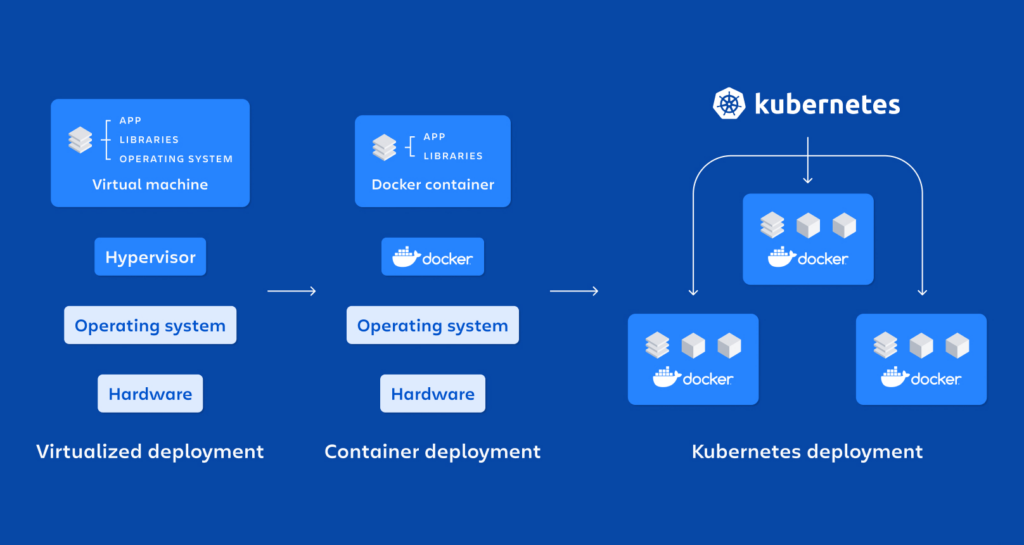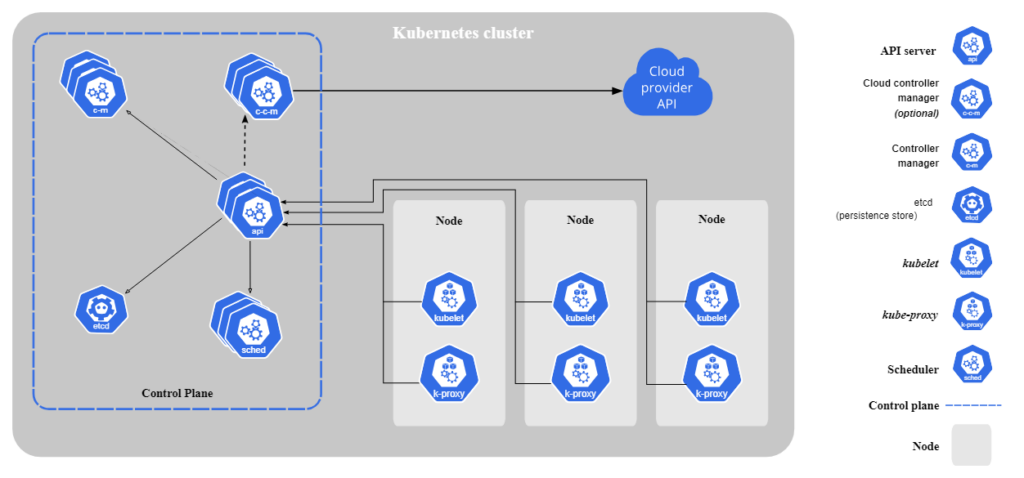Confused about the differences among Docker, Kubernetes, and containers? You’re not alone. These three technologies are often used interchangeably, but they serve distinctive roles in application development.
This blog post will provide you with a clear understanding of what Docker, Containers and Kubernetes are, highlighting their individual benefits and when to use them effectively. Ready to unravel this tech puzzle? Let’s get started!
Key Takeaways
- Docker is a software platform that allows you to build, run, and share containerized applications.
- Kubernetes is a system for operating containers, providing a platform where applications can be managed and automated at scale.
- The main difference between Kubernetes and Docker is that Docker focuses on building and running individual containers, while Kubernetes focuses on managing multiple containers across a cluster of nodes.

What is Docker?
Docker is a software platform that allows you to build, run, and share containerized applications.
How Docker Containers Work
Docker containers operate by packaging applications and their required dependencies into a compact, self-contained unit that can run anywhere. This process is called containerization, which grants each container a unique environment to function independently.
Docker runs these containers through an engine on top of the host computer’s operating system, instead of creating full-blown virtual machines for each application. By doing so, Docker effectively reduces the significant overhead that accompanies traditional virtualization methods and enhances performance in running programs across various systems without compatibility issues.
Benefits of using Docker
Using Docker offers several benefits for software development and deployment. Firstly, it allows for easy packaging and portability of applications. With Docker, developers can package their application along with all its dependencies into a single container, making it easy to deploy the same application consistently across different environments.
Another benefit is scalability. Docker enables quick and efficient scaling of applications by allowing developers to spin up multiple instances of the same container on different nodes or servers.
This ensures that the application can handle increased traffic without any downtime or performance issues.
Moreover, Docker simplifies the management and operation of containers. It provides tools to monitor and manage containers at scale, making it easier to control resources, track performance metrics, and troubleshoot any issues that arise.
What is Kubernetes?
Kubernetes is a system for operating containers, providing a platform where applications can be managed and automated at scale.
How Kubernetes Works
Kubernetes is a powerful container orchestration platform that simplifies the management and automation of deploying, scaling, and operating containerized applications. It works by grouping containers together into logical units called pods, which are then scheduled onto nodes within a cluster.
Each node runs multiple containers, and Kubernetes ensures that they are running efficiently by automatically monitoring their health and distributing workloads across available resources.
With its robust set of features such as load balancing, service discovery, self-healing capabilities, and rolling updates, Kubernetes streamlines the process of managing complex applications in dynamic environments.

Benefits of Kubernetes
Kubernetes offers several benefits for managing and automating containerized applications. One of its key advantages is its ability to handle deployment and scaling seamlessly. With Kubernetes, you can easily deploy multiple containers across different nodes in a cluster, ensuring that your application runs smoothly even during high traffic periods.
Additionally, Kubernetes provides efficient resource management by automatically allocating resources based on the workload demands, optimizing performance and reducing costs. Moreover, Kubernetes simplifies the process of managing and updating containers by providing features like rolling updates and rollback capabilities.
This makes it easier for developers to maintain their applications without causing any downtime or disruption to users. Overall, Kubernetes streamlines the entire container ecosystem, making it an essential tool for cloud-native applications and enabling more streamlined software development workflows.
Kubernetes vs Docker
Kubernetes and Docker are both popular tools used in containerization, but they have distinct differences.
Key differences: Kubernetes vs Docker
Kubernetes and Docker are both important tools in the world of containerization and software development, but they serve different purposes. The main difference between Kubernetes and Docker is that Docker is a platform for packaging and running individual containers, while Kubernetes is an orchestration system for managing and automating the deployment, scaling, and operation of those containers.
In other words, Docker focuses on building and running containers, whereas Kubernetes focuses on managing multiple containers across a cluster of nodes. Both tools have their strengths and use cases, so it’s important to understand the differences in order to choose the right tool for your specific needs.
When to use Kubernetes or Docker
Kubernetes and Docker serve different purposes in the world of containerization. If you need a platform for managing and automating the deployment, scaling, and operation of containers, then Kubernetes is the way to go.
It excels at orchestrating multiple containers across multiple nodes and provides advanced features for managing cloud-native applications. On the other hand, if you’re looking for a tool that focuses on packaging and running individual containers efficiently, Docker is your best bet.
With Docker, you can easily build, store, share, and run container images without worrying about complex orchestration tasks. So when deciding between Kubernetes or Docker, consider whether you need robust container management or streamlined container operations.

Use Cases and Conclusion
Containers, Kubernetes, and Docker each have their own unique use cases. Containers are ideal for software development, allowing for easy sharing and running of individual systems.
Kubernetes excels at managing and automating container operations on a larger scale. And Docker provides powerful tools for packaging and deploying containerized applications. Understanding the differences between them will help you choose the right solution for your deployment needs.
So whether it’s deploying microservices with Docker Swarm or building cloud-native applications with Kubernetes, these technologies offer flexible solutions to simplify your container management tasks.
Frequently Asked Questions
1. What are containers, Kubernetes, and Docker in terms of software development tools?
Containers, Kubernetes, and Docker are all software development tools designed for building cloud-native applications. Containers work to build and run isolated environments while Docker helps to store and share container images.
2. How do they relate with each other – Containers, Kubernetes, and Docker?
Kubernetes is an orchestrator that manages operations on containers built by platforms like Docker. It’s specialized in deploying complex data systems across several containers.
3. Is there any difference between automation (Containerization vs automation)and orchestration (Containers vs orchestration)?
Yes! Automation usually refers to packaging containerized applications and running simple commands whereas orchestration includes managing full lifecycle of hundreds or thousands of containers including scaling and deployment.
4. Are there alternative orchestrators available apart from Kubernetes?
Yes indeed! An alternate example would be the Docker Swarm which also provides management functions for large numbers of container deployments across varied microservices.
5. Can you use these technologies for creating Containerization platforms?
Absolutely!, They help provide consistency through managing deployments at scale making them ideal foundations upon which you can create robust containerization platforms.


